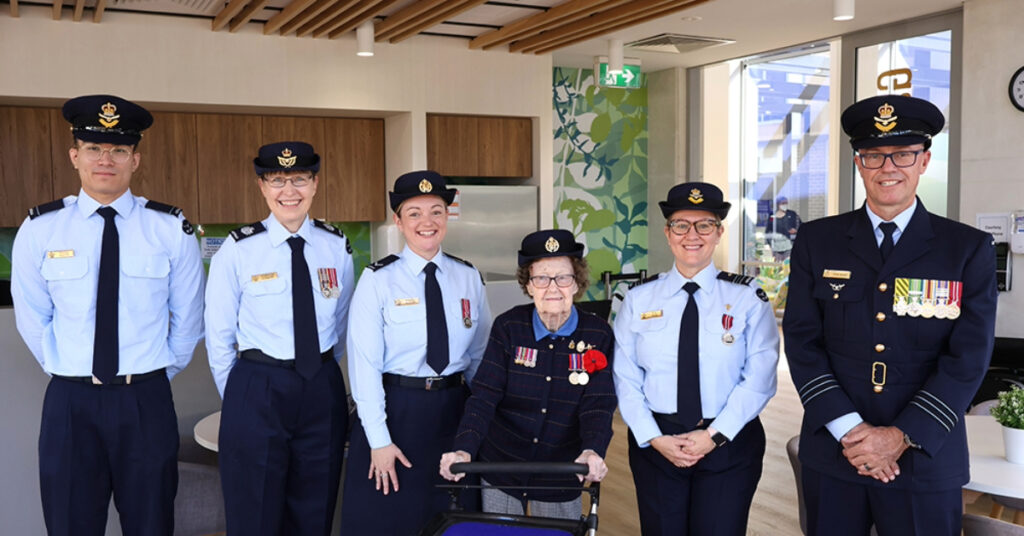
Resthaven World War II veteran Mrs Muriel Dick honoured by visit from RAAF
Mrs Muriel Dick (101), of Resthaven Aberfoyle Park, has today received a gift and a personal thank you from the Royal Australian Air Force (RAAF) for her service to the country during World War II.
Muriel was a member of the Women’s Auxiliary Australian Air Force from 1942-1946, working as a tailoress, as well as in equipment.
The gift—a commemorative certificate, Chief of Air Force coin, uniformed hat, and poppy pin—was presented to Muriel by Wing Commander Craig Keane, who was joined by other uniformed members of the RAAF: Sue Page, Stacey Watson, Sheralee Gormley, and Enoch Kavur.
The gift from the RAAF was presented as part of a moving ANZAC Day remembrance ceremony hosted in the home’s main hall, in which Muriel was specially honoured.
After hymns, poems, and a prayer of remembrance, Wing Commander Craig Keane thanked Muriel for her work in serving Australia: ‘Muriel played a vital role in the nation’s response to a call to arms to defend Australia and its national interests.’
‘We knew Muriel was unable to attend ANZAC Day events in Adelaide this year, so it is the pleasure of the RAAF to come to her!’
Residents reflected on those who had fought in the War as The Last Post was played, with a wreath laying ceremony and minute’s silence, followed by the Rouse.
Muriel was with the Air Force for just over four years, joining up when she turned 21. She still has amongst her things her identification tags, the key to her accommodation in Hut 20, and black and white photographs of her Royal Australian Air Force unit.
‘I decided to join the war effort to do my part,’ Muriel says. ‘I had the option of enlisting with the Air Force, and keeping my job at Myer so I could go back when the war finished. I signed up and I was responsible for sewing labels onto the uniforms, as well as working in equipment. I moved around to where they needed me.’
Muriel says that during her time in the Air Force they would regularly go out on training marches.
‘We would be out on a training march in the middle of the night, and one of the officers would swing a paddle around that made a “rat-a-tat noise” to imitate the “enemy” overhead,’ Muriel says. ‘We would all have to get down into the bushes and hide so that we knew how to keep ourselves safe in the event of a real enemy attack. Luckily, we never saw any action.’
‘Every day we had a barracks inspection. My bed would be checked to ensure it was properly made, and my things were in order. If something wasn’t done correctly, we would have to do it again.’
Rather than a mattress, the unit members were given a “palliasse”, a hessian bag that was filled with straw.
‘The filling would squash down, and they were quite comfortable,’ Muriel says. ‘After a little while you could get it replaced and they were then refilled with fresh straw, ready for the next person.’
‘I enjoyed my time with the Air Force,’ Muriel says. ‘Usually, things were good. It was only sometimes you would have a surprise or a calamity, and things would change.’
After the war
Muriel first made her acquaintance with her future husband, Mr Philip Dick, when she was just a teenager, enjoying herself at the local dance at the Embassy on Grenfell Street, Adelaide.
‘I remember thinking he was handsome, but nothing came of it,’ Muriel says. ‘I was not interested in marriage or the likes. Not one bit.’
During Muriel’s first year of service, the pair bumped into each other again.
‘I had no idea as a teenager that Philip was in the Air Force all along! I met him there one day and we got to talking about the good old days, and I suppose he asked me on a date.’
When the war ended, the pair were married.
‘It felt like the war was suddenly over,’ Muriel says. ‘It was a relief of course, and a relief for everyone across the whole world, but it was a big change.’
Muriel went back to Myer, where she worked until she fell pregnant. She and Phillip went on to have five children, however, tragically, she lost three of her beloved children due to complications from Rhesus disease*.
‘It wasn’t known so much back then, and they couldn’t do anything about it for me unfortunately,’ Muriel says. ‘I am pleased with how far technology has come with the disease, and I often tell my story to spread awareness.’
Now in her later years, Muriel enjoys the simple life at Resthaven Aberfoyle Park. She keeps busy with the home’s jam-packed activity schedule and looks forward to weekly visits by her closest niece, Kristy, and her 91-year-old sister, Val, who lives in a nearby retirement village.
When reflecting on today’s events, Muriel says she was ‘overwhelmed by all the fuss,’ but thrilled to have received a personal visit from the RAAF after all these years.
‘After all,’ she says, ‘to me, ANZAC Day is the most important day of the year!’
Muriel’s war time service was one of many millions that contributed to life as we know it today, and like all wartime experiences, hers is unique.
Thank you for sharing your story, Muriel! See below for a gallery of the day.
*Rhesus disease is a condition where antibodies in a pregnant woman with rhesus negative blood type destroy her baby’s rhesus positive blood cells. Rhesus disease doesn’t harm the mother, but it can cause the baby to become anaemic and develop jaundice if untreated, leading to still birth or other complications.
